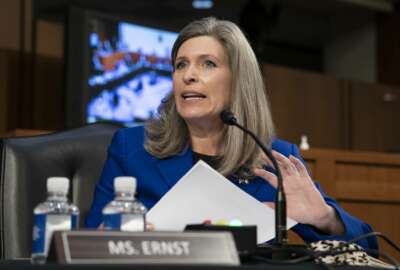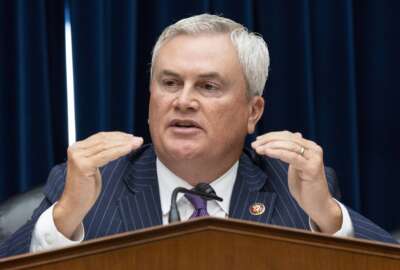9 GOP bills for federal employees to track in the new Congress
Republican lawmakers are reviving a flurry of bills targeting federal employees' telework options, pay and benefits, as well as agency relocations.
At the start of the 119th Congress, lawmakers were quick to introduce a flurry of bills that would have lasting consequences for the federal workforce.
Much of the GOP-led legislation will be familiar to federal employees — a majority of the bills have been reintroduced for at least the last couple of years. But now that Republicans hold a majority in both chambers of Congress, and with the incoming Trump administration, the prospects for the legislation may be shifting.
Here are just a handful of bills from Republican lawmakers in the new Congress that look to make an impact on federal employees’ pay, benefits and much more.
SHOW UP Act
Rep. James Comer (R-Ky.), chairman of the Oversight and Government Reform Committee, reintroduced his bill aiming to return the federal workforce to pre-pandemic telework levels. The SHOW UP Act cleared the House along party lines early in the last Congress, but the Senate didn’t take up the companion bill. The reintroduction of the legislation is a clear indication of Republicans’ stance on federal telework. Comer has said the bill wouldn’t fully eliminate telework but would largely reduce it.
Return to Work Act
Rep. Andy Biggs (R-Ariz.) has reintroduced the Return to Work Act, a bill that — similarly to the SHOW UP Act — would return federal employees to the telework schedules they had in December 2019 prior to the COVID-19 pandemic. Biggs has argued that telework worsens agency services to the public, and there’s “no excuse” for agencies to continue offering broadened telework opportunities for federal employees. Many Democrats, though, have argued that telework benefits customer service and federal recruitment. Biggs’ bill has been referred to the Oversight committee for consideration.
REMOTE Act
Another bill on federal telework, the REMOTE Act, would require agencies to track and monitor computer use of any teleworking federal employees. The data collection would cover each employee’s number of computer logins, and how long they stay logged in on their work computers. The bill would also call on agencies to collect building entry information to track how often and which employees are reporting to work in person. Sen. Joni Ernst (R-Iowa) reintroduced the bill in the last week. Agency leaders, however, have told Congress they already have ways to track teleworking employees’ performance.
DRAIN THE SWAMP Act
Ernst also reintroduced the DRAIN THE SWAMP Act as part of a package of bills targeting agencies and the federal workforce. The legislation would require 30% of agency headquarters to be relocated outside of the Washington, D.C., region. It would also mandate agencies to cut back their real estate holdings in D.C. by 30%. Already, however, about 80% of the federal workforce lives and works outside the nation’s capital. Agencies have also already started reducing their property holdings and are expected to shed millions of square feet of office space in the coming years.
SWAMP Act
Ernst’s SWAMP Act, as part of the same package of bills, similarly aims to move a number of agency headquarters outside the D.C. region. The bill focuses on headquarters offices for “non-security” agencies, and excludes the departments of Defense, Energy, State and Homeland Security, as well as several others. The legislation would also bar any new construction, renovations or lease agreements for agencies currently operating in the D.C. area.
Federal Employee Return to Work Act
The Federal Employee Return to Work Act approaches a return to office in a different way. If enacted, the legislation would eliminate locality pay for any federal employees who telework at least one day per week. Teleworking feds would receive only their base pay rates under the bill. Rep. Dan Newhouse (R-Wash.) and Sen. Bill Cassidy (R-La.) reintroduced the bicameral legislation. The lawmakers said the bill attempts to “incentivize federal employees to return to in-person work.”
Federal Employee Locality Accountability in Retirement Act
Another bicameral bill from Cassidy and Newhouse targets federal employees’ retirement benefits. The Federal Employee Locality Accountability in Retirement Act would exclude locality pay from federal annuity “high-3” calculations, in effect reducing annuity payments for federal retirees in the Federal Employee Retirement System. The previous version of the bill did not advance out of committee.
Telework Reform Act
Legislation from Sen. James Lankford (R-Okla.) would not necessarily scale back telework for federal employees, but instead focus on improving data and reporting requirements of teleworking feds. The reintroduced Telework Reform Act was previously cosponsored by Sen. Kyrsten Sinema (I-Ariz.). Under the legislation, agencies would have to conduct an annual review of their telework policies to determine if they need to be changed based on an employee’s performance. The bill would also designate a “telework managing officer” at each agency to oversee telework and remote work of staff members.
Federal Employee Performance and Accountability Act
If enacted, the Federal Employee Performance and Accountability Act from Rep. Claudia Tenney (R-N.Y.) would change the way federal employee salaries are determined. Each federal employee would be ranked as either exceeding, meeting or falling below expectations of the job. Employees exceeding expectations could get an annual pay raise of up to 10%. Employees meeting expectations would see their pay stay the same. And employees below expectations would take a pay cut up to 10%.
What comes next for federal employees?
Although many of the bills from GOP lawmakers are not necessarily new, federal employees may be bracing for significant changes during the coming Trump administration. For instance, Trump has already indicated plans to mandate a federal return-to-office, and revive a Schedule F-type policy early in his second term.
For the federal workforce, much is still up in the air, but the American Federation of Government Employees is one of many unions and employee organizations that have opposed efforts to target federal employees through a return to office, reductions of pay and benefits and relocations of federal offices. AFGE said it would oppose any attempts to “drive [federal employees] out of public service.”
“Federal workers are on the front lines protecting the American people and responding to disasters, caring for veterans and safeguarding our food supply,” AFGE Acting Legislative Director Daniel Horowitz said in a statement to Federal News Network. “They already are paid 27% less than their private-sector counterparts but serve under some of the harshest and most demanding conditions imaginable.”
Copyright © 2025 Federal News Network. All rights reserved. This website is not intended for users located within the European Economic Area.
Drew Friedman is a workforce, pay and benefits reporter for Federal News Network.
Follow @dfriedmanWFED






